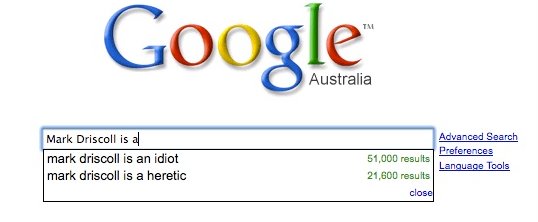At WCF last week (that’s Westminster Confession of Faith classes) we had a little discussion about oaths. I wrote about it here. It was more than a discussion. It was heated. It was an argument. Binary positions were taken. We “agreed to disagree”. Being the absolutist that I am, I hate agreeing to disagree. It’s a cop out. There’s a right and wrong on all issues. I’d rather find the right than be unsure. And if I think I’m right, I’d rather you be right than wrong.
Some people don’t like that.
The whole discussion got me thinking – especially when the other guy involved said he doesn’t think it’s a sin to be wrong, he just doesn’t do it. There’s a side issue of conscience here – where believing that something is wrong, and doing it, is wrong. But that’s not really my point. Saying that you don’t think someone is sinning when they do something that you think is wrong is a cop out. It is sinning (unless you’re wrong, then you’re sinning). It’s all forgivable though.
Mark Dever wrote a great piece on the issue of wrongness being sinful a while back where he managed to lovingly call his brothers (or himself) sinful on the issue of child baptism – depending on which position turns out to be correct.
He said this in an article in his journal:
“I have many dear paedo-baptists friends from whom I have learned much. Yet I see their practice as a sinful (though sincere) error from which God protects them by allowing for inconsistency in their doctrinal system, just as he graciously protects me from consistency with my own errors.”
That was quite controversial, so he clarified in a further post on his blog.
Some may think that such a "wrong" should not be called a sin. I understand a sin to be disobedience to God (regardless of intent). When I read Numbers 15:29-30 and Hebrews 9:7 I certainly see that Scripture presents some sins as being deliberate, and others as being unintentional. I certainly do not think my paedobaptist brethren are intentionally sinning in this. In fact, they even think that they are obeying God so, short of them changing their understanding of the Bible’s teaching on this, I can’t expect any "repentance," because they lovingly but firmly disagree with the Baptist understanding of this.
Sin taints everything. Even rightness and wrongness. It is, I think, as silly to expect that you can be purely wrong as it is to expect that you can be wrongly pure.
The question this poses is what to do with those who are wrong – do we respectfully let them stay in “sin”… I don’t know. I tend to think we should seek to lovingly speak the truth. Most objections to arguments are on the basis of conduct rather than intent. The act of speaking the truth is not the problem, it’s that it is not done with appropriate love. Wishy-washy tolerant people want to have their truth, and eat it too, while giving you the freedom to be wrong. Taking a position on a matter on the basis of “right and wrong” rather than personal preference removes subjectivity from the equation. Right and wrong, under God, are absolutes. I’m not talking about questions of taste – I don’t think anybody elevates what you have for breakfast to an absolute position. But once you’re discussing “truth” and providing any form or proof text or evidence from the Bible or elsewhere – you’ve moved into the grounds of “objective” and disagreement with your position is then, by definition, sinful. If my definition is correct.
In conclusion, I think we should be more prepared to call a spade a spade, a wrong a sin, and disagree heartily on things we don’t disagree about – so that we can work together to bring each other out of error, and sin. Oh, and we should repent of being wrong on areas we think we’re right. Agreeing to disagree is just a hollow cop out. Agree or disagree?














How to lose friends and alienate bloggers
August 20, 2009